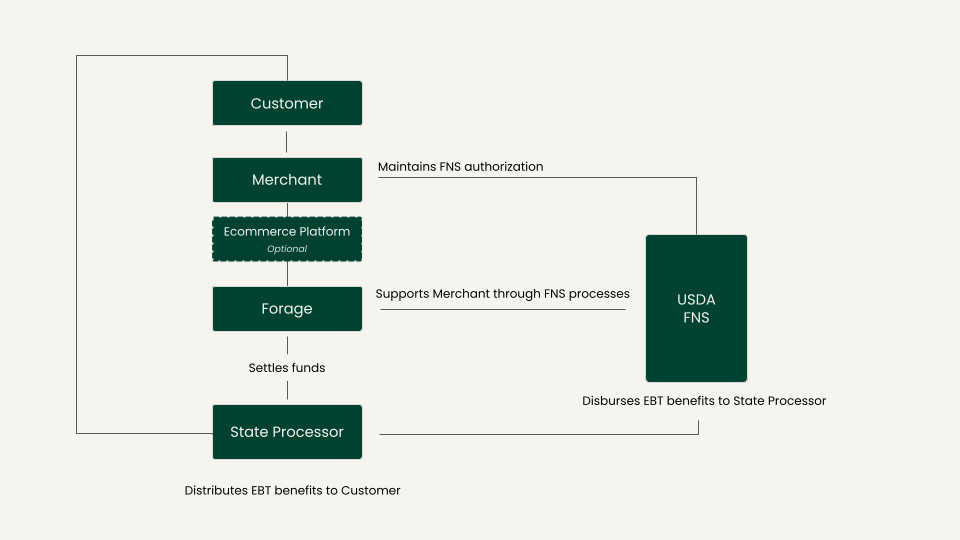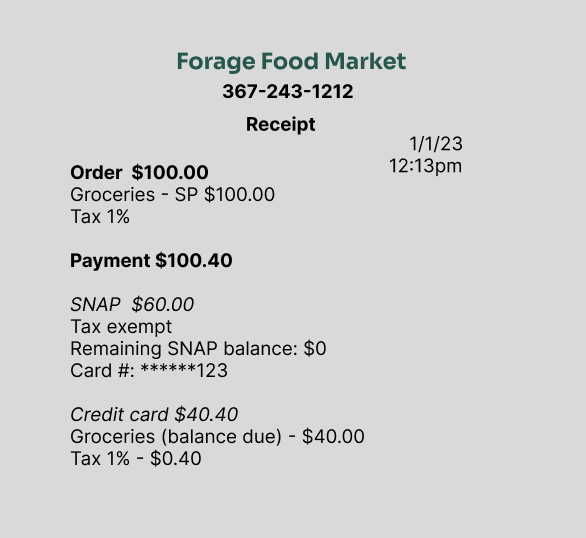EBT payments 101
Learn about the key players and payment methods involved in EBT transactions
The US government uses a system called Electronic Benefits Transfer (EBT) to distribute SNAP and EBT Cash funds to EBT cards that qualified customers can use to pay for eligible expenses.
This document defines the key industry players and payment methods involved in accepting EBT funds as a form of payment.
Industry players

FNS Approval RequiredOnly merchants approved by FNS to launch may begin accepting EBT.
Customer
A customer is the person who uses EBT benefits to make purchases from an authorized merchant.
Merchant
A merchant is a store that has received USDA FNS approval to accept EBT benefits as a form of payment. Merchants, or the ecommerce platform that they use, integrate with Forage to accept EBT payments online.
Learn more
Ecommerce platform
Some merchants process orders through an ecommerce platform. An ecommerce platform is a site or app, like Shopify, that provides a ready-to-use customer experience for buying goods online.
Third Party Processor (TPP)
A Third Party Processor is a service provider that the merchant contracts to route customer payments for card issuer approval and to manage funds settlement. Forage is a TPP for EBT transactions.
Credit/debit Payment Service Provider (PSP)
In addition to using Forage as a TPP for EBT transactions, merchants need an account with a credit/debit PSP, like Stripe, to route and settle credit/debit card payments.
Credit/Debit Processing OptionMerchants can use Forage to process credit/debit in addition to EBT transactions if they choose a Fully Hosted integration and grant Forage limited access to their credit/debit TPP account. Learn more about Fully Hosted integrations.
United States Department of Agriculture (USDA)
USDA is the federal agency that regulates food and farming. It is FNS’ parent agency.
Learn more
Food and Nutrition Service (FNS)
FNS is the USDA agency that distributes funds from programs like SNAP and TANF that provide government-subsidized food and nutrition benefits to qualified individuals.
FNS distributes a US state’s EBT funds to that specific state’s processor for distribution to customer accounts.
FNS authorization
Every merchant, both brick-and-mortar and online, that wants to accept these benefits as a form of payment must first apply for FNS authorization to accept EBT online. Forage partners with FNS to help merchants navigate authorization.
Brick-and-mortar stores must fill out an online application to accept SNAP benefits at their physical locations. Their FNS number then needs to be authorized specifically for online sales as part of the SNAP online purchasing pilot requirements.
Online-only merchants only need to complete the SNAP online purchasing pilot requirements.
In addition to the above applications, Forage supports merchants in submitting the primary required documents, the Letter of intent (LOI) and Business Requirements Document (BRD), along with any additional requested documents.
Letter of Intent (LOI)
The LOI states a merchant’s intent to accept EBT benefits as a form of payment online and to meet FNS requirements to do so. Forage provides merchants with a template LOI. FNS then acknowledges and approves a merchant’s eligibility to continue with authorization.
Business Requirements Document (BRD)
The BRD is documentation that explains in detail how the merchant meets FNS requirements on their website and/or mobile apps. Forage partners directly with merchants to complete the BRD.
Learn more
Supplemental Nutrition Assistance Program (SNAP)
SNAP is a US federal program that subsidizes eligible food purchases for more than 42 million Americans.
In almost all cases, Forage uses the acronym SNAP to refer to a customer using the program benefits as a form of payment.
Learn more
Temporary Assistance for Needy Families (TANF)
TANF is a US federal program that subsidizes living expenses for qualified individuals.
TANF benefits are distributed as EBT Cash.
Learn more
State processor
A state processor connects a US state’s EBT funds to TPPs like Forage. Each US state has only one processor. The processors today are: FIS, Conduent (formerly Xerox), Inmar (LA only) and Solutran (MT only).
Learn more
Payment methods
EBT benefits
EBT Terminology ClarificationForage uses "EBT" to refer to both SNAP and EBT Cash transactions. If a transaction involves only SNAP or only EBT Cash, then Forage specifies the relevant tender.
SNAP
A customer can use SNAP benefits to buy eligible food items.
SNAP can’t be used to cover delivery, service, pickup, bag, or manufacturer-added deposit fees. Only bottle deposit fees, as mandated by specific US state laws, can be covered by SNAP.
The SNAP amount of a purchase is tax-exempt. For example, if a customer uses $20 of SNAP to pay for part of a $100 cart, then the $20 of SNAP is tax-exempt. If a customer pays for an entire cart in SNAP, then the purchase is tax-exempt.
Learn more
EBT Cash
A customer can use EBT Cash to pay for eligible living expenses. EBT Cash is more flexible than SNAP is. It can be used for household goods and also for shipping, delivery, or other service fees. It can also be used for SNAP. All items that are SNAP eligible are also EBT Cash eligible.
Only half of all US states provide EBT Cash benefits, so EBT Cash transaction volume is about 10% the size of SNAP volume. Despite the lower volume, Forage recommends that merchants support EBT Cash as a payment method. A single Forage integration can process both SNAP and EBT Cash with minor changes. For minimal extra development effort, accepting EBT Cash supports underbanked customers, those with limited or no credit card to pay for delivery and service fees.
Unlike SNAP transactions, which are tax-exempt, EBT Cash transactions are subject to taxes.
Learn more
Separate SNAP And Cash TotalsAt the checkout level, when you pass information about a customer's cart to Forage, keep
snap_totalto SNAP eligible items only, andebt_cash_totalto EBT Cash eligible items only.
EBT cards
A customer uses the same EBT Card to make SNAP and/or EBT Cash purchases. Every EBT Card has a PAN and a PIN.
EBT Card PAN
The EBT Card PAN is the card number. It contains 16-19 digits, depending on the card’s US state. The first six digits identify the state or territory that issued the card.
Learn more
EBT Card PIN
The EBT Card PIN is a four-digit number that identifies the cardholder. Forage collects and transmits, but never stores the PIN.
Example EBT Card numbers for testingCheck out the Test EBT Cards guide for a list of example EBT Card numbers.
Split tender
EBT customers almost always need to use multiple payment methods on a single order. For example, an EBT Card pays for EBT eligible items, and a credit/debit card covers the ineligible items and fees, or an outstanding balance. Split tender refers to a transaction that requires distributing the total order cost across multiple payment methods.
Tax exemption and split tender
The SNAP amount that a customer uses to pay for an order is tax-exempt. If after applying SNAP there’s an outstanding balance on the order, then tax needs to be calculated on the amount due.
Consider the following example receipt. A customer placed an order for $100 of groceries with a 1% tax rate. After applying $60 in SNAP benefits, $40 remains. 1% tax is calculated on the $40 amount, resulting in $0.40 in tax. The total balance charged to the credit card is $40.40. The total payment for the order is $100.40.

Gift cards, cashback, or coupons
In addition to EBT Cards and credit/debit, customers might also pay with gift cards, cashback, or coupons. Forage recommends applying these discounts, starting with the soonest to expire, before applying a customer's EBT SNAP funds. This approach minimizes credit card spend for the customer. For more information, refer to the Forage guide to coupons.
Nomenclature
The table below details Forage's recommended way to refer to common EBT SNAP concepts, based on how the related terms appear in FNS documentation. The last column provides a counterexample that would contradict FNS.
While there are no strict compliance rules around EBT SNAP language, keeping vocabulary consistent provides a better user experience for both SNAP customers and FNS regulators. If you have any questions about any of the recommendations, then reach out to your Forage Account Manager.
Concept | Recommended customer-facing language | Counterexample |
|---|---|---|
Customer's benefit card | ✅ EBT Card | ❌ SNAP Card |
Text to prompt customer to add a payment method | ✅ Add EBT Card | ❌ Add SNAP Card |
How to display truncated card numbers | ✅ EBT ****1487 | ❌ SNAP ****1487 |
How to note a product's benefit eligibility on a product or landing page | ✅ SNAP eligible | ❌ EBT |
How to note eligible items within a checkout flow | ✅ SNAP | ❌ EBT Eligible |
Text to prompt customer PIN entry | ✅ Please enter your EBT PIN to authorize a balance check | ❌ Please enter your SNAP PIN to authorize a balance check |
SNAP balance within Order receipts | ✅ SNAP balance | ❌ EBT SNAP Balance |
Next steps
- Explore Forage integration types
Updated 4 months ago
